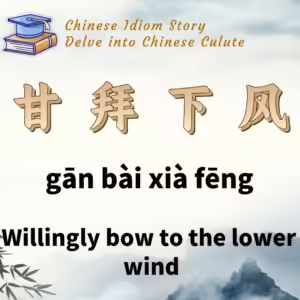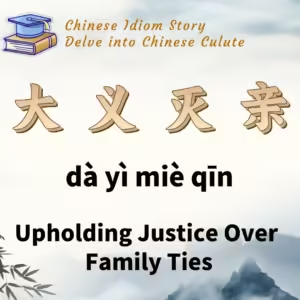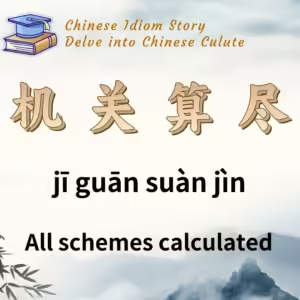
Chinese Idiom: 甘拜下风 (Gan Bai Xia Feng)
English Translation: Willingly bow to the lower wind
pīn yīn: gān bài xià fēng
Idiom Meaning: This idiom is used to express sincere admiration or acknowledgment of being inferior to someone else. It signifies a willingness to concede or admit defeat with humility and respect.
Historical Source: Zuo Zhuan (《左传》), specifically from the story involving the Jin and Qin states during the Spring and Autumn period.
Idiom Story:
During the Spring and Autumn period, Duke Xian of Jin (晋献公) was influenced by the malicious schemes of Li Ji, leading him to kill his crown prince, Shen Sheng, and force his other sons, Chong’er and Yiwu, into exile. Yiwu fled to the state of Qin, where he promised to cede five cities to Qin in exchange for their support in reclaiming the throne of Jin.
In 651 BC, after the death of Duke Xian, there was turmoil in Jin as different factions struggled for power. Yiwu, with the military support of Duke Mu of Qin, returned to Jin and became its ruler, known as Duke Hui of Jin (晋惠公). However, once in power, Duke Hui reneged on his promise to cede the cities to Qin.
The following year, when Jin experienced a poor harvest and a food shortage, Duke Hui requested grain from Qin, and Duke Mu generously provided it. But when Qin later faced a similar situation, Duke Hui not only refused to return the favor but also took the opportunity to invade Qin. In 645 BC, Jin’s army attacked Qin, leading to a battle at Han Yuan (in modern-day Shanxi Province). The Qin forces, led personally by Duke Mu, decisively defeated Jin, capturing Duke Hui and his general Han Jian.
As Duke Mu led the prisoners back to Qin, the ministers of Jin, disheveled and humiliated, followed their captured lord. Seeing their pitiful state, Duke Mu reassured them that he would not harm their ruler. The Jin ministers, deeply grateful and respectful, responded by bowing and saying, “We humbly bow to the lower wind,” meaning they acknowledged their inferiority and sincerely respected Duke Mu’s generosity.
The phrase “群臣敢在下风” (“the ministers dare to be in the lower wind”) was later shortened and transformed into the idiom “甘拜下风.” Over time, it became a common expression used to show respect and acknowledge one’s own inferiority in comparison to another’s superior abilities, achievements, or virtues.






